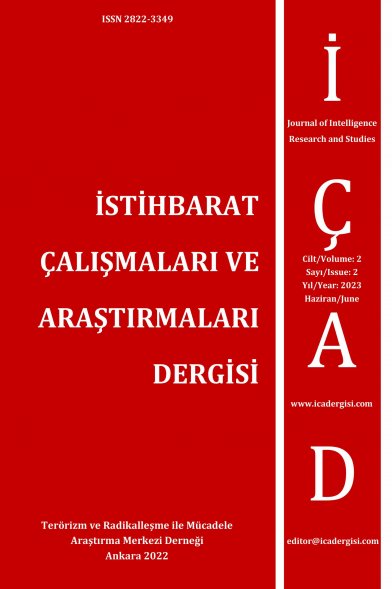Dönüşen Bilgi ve İletişim Dönemleri Boyunca Entelektüel Rekabet ve Statü Sınıfları Yaklaşımıyla İstihbarat
Bilgi, Entelektüel, Entelijansiya, İletişim, İstihbarat.
Intelligence with the Approach of Intellectual Competition and Status Classes During Transforming Information and Communication Eras
Information, Intellectual, Intelligentsia, Communication, Intelligence. ,
___
Agrell, W. (2012). The next 100 years? Reflections on the future of intelligence. Intelligence and National Security, 27(1), 118-132.
Aktaş, C. (2014). QR Kodlar ve İletişim Teknolojilerinin Hibritleşmesi. Kalkedon.
Alemdar, E. (2017). Dar anlamda istihbaratın temelleri, Erişim tarihi: 13.06.2022, https://www.akademikkaynak.com/dar-anlamdaistihbaratin-temelleri.html
Nevins, A. ve Commager, H.S. (2005). ABD Tarihi, (Çev: Halil İnalcık), Doğubatı Yayınları.
Armaoğlu, F. (2016). 19. Yüzyıl Siyasi Tarihi 1789-1914. Kronik Kitap.
Assange, J., Appelbaum, J., Müller-Maguhn, A., ve Zimmermann, J. (2012). Cypherpunks: Freedom and the future of the internet. OR Books.
Billington, J.H. (1980). Fire in the minds of men. Basıc Books Inc. Publishers Cambridge Sözlük, (2022). Erişim tarihi: 10.04.2022, https://dictionary.cambridge.org
Çamur, S. (2019). Tanzimat dönemi romanlarında elit ve entelektüel temsili. (Yayımlanmamış Doktora Tezi) Yıldırım Beyazıt Üniversitesi Sosyal Bilimleri Enstitüsü, Ankara.
Dindar, S. (2021). İletişim ve çeviri: Kitle iletişim kuramlarına çeviri açısından bir yaklaşım. Rumeli Dil ve Edebiyat Araştırmaları Dergisi, (23), 1012-1026.
Dönmez, G. (2019). Devlet ve istihbarat metodolojisine giriş. Ötüken Yayıncılık.
Ebheri, E. (1998). İsaguci: Mantığa giriş. İz Yayıncılık.
Gioe, D. V., Lovering, R., ve Pachesny, T. (2020). The Soviet legacy of Russian active measures: New Vodka from old stills. International Journal of Intelligence and CounterIntelligence, 33:3, 514-539, DOI: 10.1080/08850607.2020.1725364
Grobman, S. (2020). Quantum computing’s cyber-threat to national security. PRISM, 9(1), 52-67.
Hagen S. (2005). Avrupa'da ulus ve devlet. (Çev.: Timuçin Binder), Literatür Yayıncılık.
Çıvgın, İ. ve Yardımcı, R. (2009). Çağdaş dünya tarihi. Eğiten Kitap.
Janowski, M. (2015). Birth of the Intelligentsia–1750–1831: A History of the Polish Intelligentsia–Part 1, Ed. Jerzy Jedlicki. Peter Lang International Academic Publishers.
Jennings, J. ve Kemp-Welch, T. (1997). The century of the intellectual: From Dreyfus to Salman Rushdie, Intellectuals in Politics, Routledge.
Kahn, D. (2001). An historical theory of intelligence. Intelligence and national security, 16(3), 79-92.
Klimski, W. (2022). Religiosity of the Polish intelligentsia at the beginning of the twenty-first century. In Metamorphoses of Religion and Spirituality in Central and Eastern Europe (pp. 105-128). Routledge.
Koryś, P. (2018). Poland From Partitions to EU Accession: A Modern Economic History, 1772–2004. Springer.
Lindsay, J. R. (2020). Surviving the Quantum Cryptocalypse. Strategic Studies Quarterly, 14(2), 49-73.
Lowenthal, M. M. (2010). The policymaker-intelligence relationship. The Oxford handbook of national security intelligence.
Machon, A. (2005). Spies, lies and whistleblowers: MI5, MI6 and the Shayler affair. Book Guild Limited.
Mitchell, M., Mitchell, T. ve Dunlop, H. (2019). The spy who tried to stop a war. William Collins.
Nitu, I. (2012). Three Critical Factors in Intelligence Activity: Product, Process, and Personnel (The 3P Project). American Intelligence Journal, 30(2), 57-67.
Ory, P., & Sirinelli, J. F. (2002). Les Intellectuels en France. de l’affaire Dreyfus à nos jours Ory P. and Sirinelli J.F. (2002). Les Intellectuels en France. De l'affaire Dreyfus à nos jours (The Intellectuals in France: From the Dreyfus Affair to Our Days). Armand Colin.
Prunckun, H. (2010). Handbook of scientific methods of inquiry for intelligence analysis (Vol. 11). Scarecrow Press.
Pehlivanlı, H. (2002). Eski Türkler ve Selçuklularda istihbaratçılık. HC Güzel vd. (Ed.), Türkler, c, 5, Yeni Türkiye Yayınları.
Pehlivanlı H. (2002). Osmanlılarda İstihbaratçılık. Türkler Ansiklopedisi, 13. Cilt.
Sander O. (2002). Siyasi tarih ilk çağlardan 1918'e. İmge Kitabevi.
Seskir, Z. (2017). Tüm sırların ifşa olacağı gün yaklaşırken, Erişim tarihi: 6 Ocak 2022, https://duzensiz.org/tum-sirlarin-ifsa-olacagi-gunyaklasirken-8139832904e6
Shannon, CE. ve Weaver W. (1964). The Mathematical Theory of Communication. University of Illinois Press.
Snowden, E. (2019). Permanent record. Macmillan.
Sowell, T. (2012). Intellectuals and society. Hachette UK.
Sowell, T. (1980). Knowledge and Decisions. Basic Books
Szczepanski, J. (1962). The Polish ıntelligentsia: Past and present. World Politics, 14(3), 406-420.
TDK “Türk Dil Kurumu Sözlükleri”, (2022). Erişim tarihi: 12 Şubat 2022, https://sozluk.gov.tr/
Temur, F. (2014). Cambridge Beşlisi. Hitapevi Yayınları.
Usta, A. ve Doğantekin, S. (2017). Blockchain 101. MediaCat Kitapları. Verçin, A. (2018). Yeni bir bilişim çağına doğru kuantum
Walicki, A. (2009). Rus düşünce tarihi: aydınlanmadan Marksizme. İletişim Yayınları.
Walicki, A. (1982). Philosophy and romantic nationalism: The case of Poland. Clarendon Press.
Waltz, E. L. (1998). Information warfare principles and operations. Artech House, Inc.
Whitman T. ve McElreath D. (2020) Overview of the intelligence disciplines. Erişim tarihi: 12 Haziran 2022, https://www.researchgate.net/publication/344224551_Overview_of_th e_ Intelligence_Disciplines? channel=doi&linkId= 5f5daef992851c0789631b06&showFulltext=true
Yayla, T. O. (2017). Analogdan dijitale iletişim teknolojilerinin gelişimi: Sosyal medya ve Sosyal gelişim. (Yayımlanmamış Yüksek Lisans Tezi), İstanbul Ticaret Üniversitesi Sosyal Bilimler Enstitüsü.
- ISSN: 2822-3349
- Yayın Aralığı: Yılda 2 Sayı
- Başlangıç: Haziran 2022
- Yayıncı: Terörizm ve Radikalleşme ile Mücadele Araştırma Merkezi Derneği
Açık Kaynak İstihbaratı ve Askeri İstihbarat
Tehditlerle Mücadelede Toplumla Çalışmak: Bir Başvuru Aracı Olarak Kitle Kaynak İstihbaratı
Chinese Disinformation Efforts on Social Media
Baş Editör’den - Askeri İstihbaratın Temeli: İyi İstihbarat Bir Komutanın Elindeki En İyi Silahtır
Terörizmle Mücadelede Sosyal Medya İstihbaratı: FETÖ/PDY Terör Örgütü Sosyal Ağ Analizi Örneği
